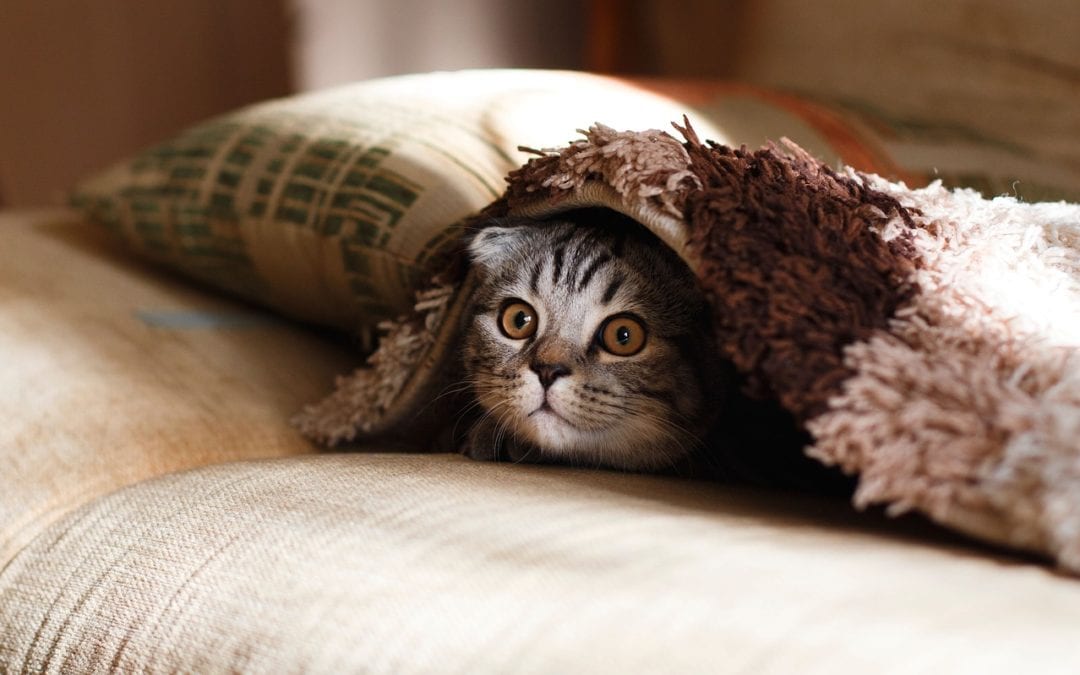We’re so excited to ring in the New Year in a few short days! New Year’s Eve is one of the party nights we most look forward to in the year, but it can also be a night of high anxiety for our pets. With the fireworks, loud music, shouts and laughter, and in some areas even the banging of pots and pans or gunfire, our normally sedate pets may feel that their world is under attack. Some pets will go so far as to jump out of windows or bloody their paws trying to escape through locked doors. To help your pet get through the noisy night, consider these tips.
Confining Your Pet
Many pets have a favorite hiding place where they go when they are frightened. For some, a crate can lend a feeling of safety and security, but this is not true for all pets. If your cat or dog has not grown up using a crate and is not comfortable with it, he may find it more stressful to be confined and may even injure his teeth or nails trying to get through the crate door. Know your pet. If you cannot use a crate, place him in a room where he cannot hurt himself or damage your belongings.
Using Positive Noise to Distract Your Pet
Even if you have not been using noise conditioning before now, you can still try using a distracting noise to help cover up the alarming sounds. Calm classical music can help to relieve many animals’ anxiety. Turn the music up to a comfortable volume; enough to drown out some of the loud party sounds, but not too loud to be disturbing to your pet. Some pets also like to watch TV. If your cat or dog has a favorite show to watch, record it so you can play it for several hours at a time.
At other times, get your pet used to hearing loud noises by playing louder types of classical music, with lots of brass and percussion, recordings of thunderstorms, and movie soundtracks – Star Wars is a favorite for this exercise. Play the sounds when nothing else is going on. Give your pet treats when he stays calm during the noise, and speak soothingly when he seems a little nervous. Let him know that everything is okay as you go about your normal routine.
Natural Calming Therapies for Pets
For dogs, lavender oil, which has been found to reduce car anxiety in dogs, can be helpful. Make sure the oil has the name Lavendula augustifolia or Lavendula officinalis. It can be used either on the skin or by letting your dog smell it. Try spraying the lavender oil on your dog’s favorite blanket. ProQuiet, a chewable tryptophan tablet, or in syrup form, can also help in calming dogs and cats. And canine pheromone sprays can be helpful for the mildly affected (there are several types and brands available).
For cats, many owners find that Feliway sprays are very helpful. Feliway is a synthetic copy of the facial pheromone cats use to mark their territory as safe and secure. It can be used as a plug-in room diffuser, or as a spray.
Exercise Your Pet to Calmness
Get your dog outside to a park (or the equivalent) for as much exercise as he can handle.
If you have a cat, plan out your day to spend time with feather wands and laser pointing toys. Keep your cat moving for as long as you can before the evening’s revelry begins.
Hopefully, when the noise starts, your pet will be too tired to get very stressed out by it.
Distract Your Pet With Toys and Games
Give your dog or cat some food puzzles to play with during the time when there will be a lot of noise, or get a few new toys for him to play with.
If you have a cat, try spritzing catnip spray on the new toy to keep him interested, and for dogs, stuff a puzzle toy with peanut butter to keep his attention focused.
Leave the Neighborhood for the Night
Do you have friends or family who live in a quiet place? If you know for sure that none of the tips here will help your pet’s severe anxiety, pack up the travel crate and all of the other things you will need for an overnight away from home and then hightail it to a quieter neck of the woods. If nothing else, you can find an out of the way, pet-friendly hotel to crash in for the night, where you and your little furry one can rest comfortably and noise free.
If you are a dog owner living in one of the warmer Southern states, you may even consider grabbing a tent and “roughing it” in the peace and quiet of nature. Now that’s celebrating the New Year in style.
Don’t Hold Back on Comforting Your Pet
Finally, forget everything you have heard about ignoring your pet’s anxiety for fear of encouraging it with attention. Imagine how you would want to be treated if you were feeling that level of anxiety. Would you want to be ignored and brushed aside? Would being comforted by a loved one make you more scared or less scared?
The best thing you can do for your pet when he or she is anxious is to stay calm – show your pet by example that there is nothing to be afraid of – speak soothingly, show lots of calm affection, and give treats when he or she is being calm. Some pets will learn from this that as long as you are near they are safe and they may stop being as clingy. But remember that our pets, like us, can be high strung and may always need to be comforted during noise-filled events.
Talk to Your Veterinarian
If your pet’s doctor is already familiar with your issue, you may be able to have your vet call in an anti-anxiety prescription for your pet. This will not be helpful if you have never talked to your vet about your pet’s anxiety before; most veterinarians will not call in a last minute prescription for a pet they have not previously diagnosed with noise anxiety.
Valley Veterinary Clinic is here to help – please don’t hesitate to contact us with any questions or concerns.

